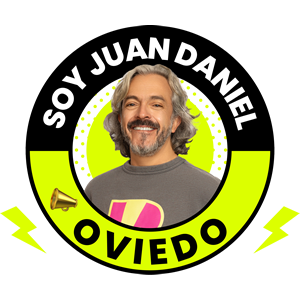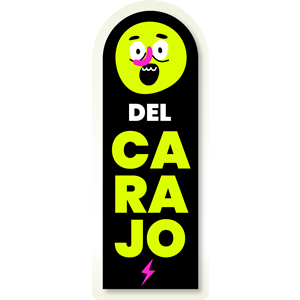Who’s this then?
The best coiffeured candidate in the mayoral race, Juan Daniel Oviedo boasts a lion-esque mane. He is a self-described gomelo and ex-director of DANE. He’s lived his whole life in Bogotá and both studied and taught at the Rosario in central Bogotá. That’s a university more famous for presidents than mayors, so watch this space.
He’s openly gay and represents the cool kids of Bogotá. Campaign materials are lurid and very zona T in style. Ásilo (not in the zona T) is apparently his favourite nightclub, which means we have to admire his musical taste at least. He’s also independent, standing for Bogotá con Toda! He means it too, claiming he is a new voice. More on that later.
We contacted all the candidates we’re profiling with a couple of questions. Oviedo replied to us quickly with a press contact who said they would get back to us. That didn’t happen, so there are no quotes in this piece.
Is he polling well?
He’s certainly there or thereabouts. The big question for him is whether he can move ahead of Bolívar to make the run-off. With Galán seemingly nailed on for first place, it’s Bolívar that Oviedo is targeting. He has oscillated between 15% and 20% in most polls but in recent weeks has been nudging the 20+ boundary.
If he gets to the second round, the polls have him losing by about 15 points to Galán but winning against Bolívar by more than 20. Those might seem like big numbers, but there’s well over a month before a second round concludes, so plenty of time to reel them in. Also, the polls only measure reaction to what each candidate has said so far.
Expect the narratives to change in a second round situation. Most voters don’t even pretend to read the planes de gobierno and so a lot will hang on debates and intense social media wars. Oviedo has the irritating habit of retweeting praise for himself from others, but he’s otherwise a canny operator on the socials.
What’s his manifesto like?
It’s here and is not perhaps what you might expect. For example, he highlights that Bogotá has lost about 10% of its relative GDP inside Colombia over a two decade period, without mentioning demographic changes, the performance of other regions or the baseline relative to share of population. A little cheeky from a statsman.
His gambit is that it’s all about the economy, stupid. He’s right, too, raising GDP solves lots of problems directly or indirectly, and both Bogotá and Colombia do have some worrying indicators. However, most voters seem to be surprisingly blasé about finances. It doesn’t rank high on polls, and is often seen as a thing like the weather that can’t be controlled.

He wants 287,000 new jobs, which is noble. He thinks that the green economy has growth potential, as does tourism, which will be helped out by more artistic and cultural events to act as a driver. He will create programs to promote social inclusion and encourage people to hire workers from a range of disadvantaged backgrounds.
Microbusiness is another area that he thinks can grow, which is slightly surprising. Still, small and micro businesses are important in Bogotá and this will hopefully protect them further. Entrepreneurs will receive free courses and other subsidies with some red tape cut, which will be great. Also community workplaces to save costs on machinery etc.
Inclusion all round for all communities at risk of exclusion and stigmatism. Notably, this includes teaching about LGBTQI+ issues from a young age. Flexible working hours to be encouraged in order to balance household labour between the sexes. Special priority for Venezuelan migrants for socioeconomic inclusion.
Schools will be put at the centre of barrios, and there will be a continuation and amplification of the jóvenes a la U project to try and get more kids into university. More support for those trying to get becas and funds for university and a new system of financing that.
On crime, a key issue for many bogotanos, he thinks the capital is 5,300 coppers short and intends to close that gap. He wants to do that through the police school in Bogotá. Lots more tech and analysis, as everyone’s saying, but it’s starting to sound like a magic stick now.
On the tricky topics that make up the top transport themes, he wants to sort out crime in the TransMilenio. But more interestingly, he aims to build respect for public space and combat disorder. He’s also going to create response units to attend road crashes in peak hours.
He wants a walkable and cyclable city for everybody, including those with mobility problems and zero road deaths. Good luck there, especially as he’s trying to get road deaths down (yes, down) to 380 a year – a long way from zero. He notes that speed controls should be in place but aren’t being enforced. He’ll change that, he says.
The Metro will go ahead as planned, and he is the only candidate that is happy with the corredor verde project that Claudia is trying to get through the council before leaving office. This is perhaps surprising, given that the people opposing it are the rich and privileged, meaning the Gomelo King is going against type here. He proposes some 24 hour bus coverage.

Overall, he is excellent at identifying the genuine problems that Bogotá has, as well as noting future issues to look out for. That’s something that Colombian politicians aren’t always good at, so it earns a cap doff. That said, understanding the problem is very different from finding the solution – and further still from being able to implement said solution.
Nowhere is this better seen than in his numbers. He’s got stats dotted around the document that analyse the situation of Bogotá very well, but few numbers as pledges. Apart from the 5,300 police officers, there’s lots of direct light shone on the present and little into the future. An admirable thing in a journo and teacher, not so much in a mayoral candidate.
What’s he been saying on the campaign trail?
Of all the candidates, he does seem to have made the most effort to meet with everyone, travelling the length and breadth of the city to engage with different areas. This also led to him going on a pretty distasteful poverty safari to live in Bosa Brasilia so that he could experience what it’s like down there. Jarvis Cocker wouldn’t approve.
In the debates, he’s been charismatic and principled, rebuking other candidates for referring to just ‘trans’ and not ‘personas trans’, for example. He’s attended hustings with diverse groups too, from the disabled community to LGBTQI+ centres. He seems much more likely to pass the Turing test than most politicians.
The gay issue hasn’t been a big deal in this campaign, but the infamous billboards of Bolívar did make the claim that he was secretly in love with Uribe. Oviedo saw this as a cheap reference to his sexuality, pointing out that it carried homophobic undertones. In general he’s gone to great lengths to distance himself from the CD or uribismo.
While he laughs about and plays up to the gomelo nickname, he absolutely doesn’t act that way at all. He’s very open and inclusive, going out of his way to try and reach corners of the city that are normally ostracised or ignored. No classism here.
Any skeletons in the closet?
He was under investigation by the CNE to check that his candidature was above board, with a very real chance of being barred from standing. His potential crime? Renting an office in the centro internacional through the fondo nacional de garantías. That was resolved in his favour, which he called a rebirth. Seems very minor to us.
He did serve as director of DANE under Iván Duque before going on to work for RCN. Although he prefers to position himself as a level-headed centrist economist, there will be plenty of people that see him as being in the pocket of rightwing thinkers and lobbyists. Persistent claims of corruption in the Duque administration hardly help.
Can he work with the central government?
He almost certainly can, but it won’t all be plain sailing. Most of the left see him as a secret Uribestia, so there’s likely to be tension from the Palacio de Nariño. He claims, like the central government, to represent change and a new way of doing things, so they may find common ground there.
Neither side is going to like each other very much, but they’ll grin and bear each other in the short term for sure. Having worked at DANE during the pandemic, he’s sure to have the requisite skills for diplomacy and negotiation to get things done. Whether the other side can rein in their paranoia about him being a puppet of the right is another question.
Can he win?
He has a chance, but he’s an outsider. His main problem is that he’s simply between wickets. Galán squeezes him in the middle and he can’t appeal to the flanks like Bolívar or Lara. He’s widely seen as Galán with better hair, so why not go with the original?
If he gets to the second round against Bolívar, he’s laughing, but that requires a lot of good fortune on his part. Against Galán, there will be an almighty struggle for the two of them to differentiate themselves. He absolutely has a puncher’s chance in that situation, so the first round is key for him. Get past that hurdle and anything could happen.





